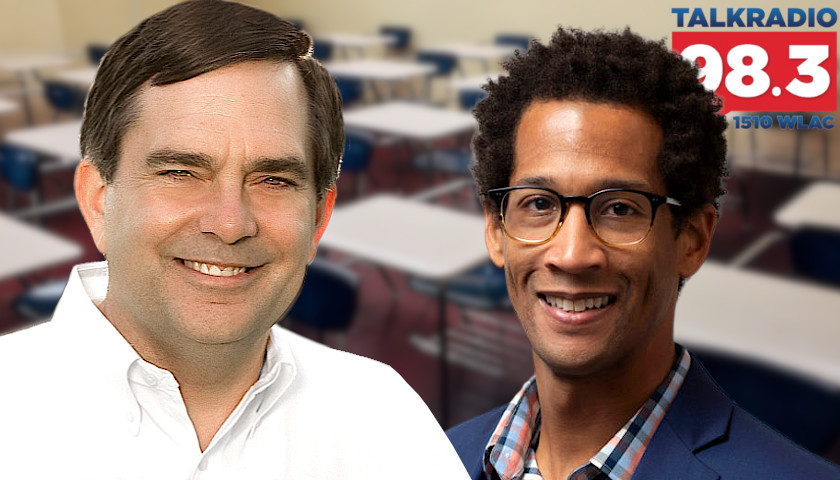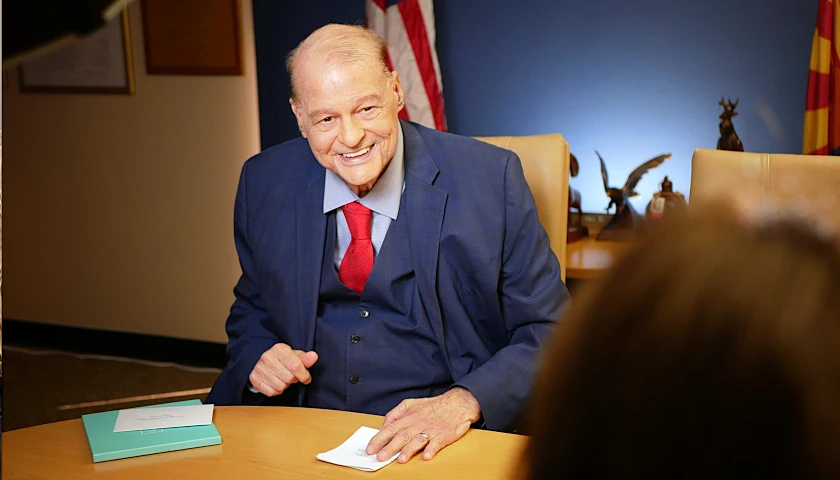In a detailed discussion on Wednesday morning’s Tennessee Star Report with Steve Gill and Michael Patrick Leahy – broadcast on Nashville’s Talk Radio 98.3 and 1510 WLAC weekdays from 5:00 am to 8:00 am – host Michael Patrick Leahy talked exclusively with Tennessee’s director for The American Federation for Children’s, Shaka Mitchell about today’s House Education Committee’s vote on Governor Bill Lee’s ESA proposal.
Leahy: And we are joined now by Shaka Mitchell. Shaka was going to tell us a little bit about the details of what’s going on at Capitol Hill. Shaka welcome.
Mitchell: Hi. Good morning. Thanks for having me on.
Leahy: We’re delighted to have you on. So tell us a little bit about what’s going on with the education savings account bill. It’s really a number one priority for Governor Lee. How did you get involved in this and what’s your view on it?
Mitchell: It sure is. You know you’re absolutely right. This is I think, probably the top priority for the governor right now and we’re seeing a whole lot of activity here at the legislator surrounding this bill. And really surrounding education. I think the reason why is pretty clear.
You know out of about one point two million school-aged children in Tennessee only about thirty-five percent of those graduate high school, college, or career ready. And so you know thirty-five percent. If you had a thirty-five percent success rate for anything else you’d say, “Well that doesn’t work. We got to…
Leahy: Not a very good success pattern. And so your role as Tennessee director for the American Federation for children, has been, I think you’ve been very involved in the preparation of the details of this bill. Is that right Shaka?
Mitchell: Yeah we sure have. We work our organization works across a number of states. So we’re always on the look out for best practices. How do you take these ideas around parent choice, school choice, and tailor them to our unique communities. To make sure it works in our state. To make sure it works with our constitution and it ultimately gives kids what they need.
So we’ve been really involved and also involved in educating the legislators who as you know we’ve had so many new legislators in Nashville this year that there is just a lot of folks who have never even thought about education budget and they’ve never just thought about the scale and the scope of the problem here in the Volunteer state.
Leahy: What are the main objections that we’ll hear Shaka from the opponents of this bill when it comes to a vote and how do we address those?
Mitchell: I think one of the main objections is frankly, the main objection has nothing to do with kids and has everything to do with money which is to say it has everything to do with power. So you’ll hear folks on the other side say “Well this is just going to take money from public schools.” And that couldn’t be further from the truth. In fact nationally on average private choice programs like this save over three thousand dollars per pupil per year.
So we know there’s big savings. And that’s going to be the case here in Tennessee because in the education savings accounts only touch the state portion. So there’s sort of a local share, a local portion of the county commissions appropriate. The education savings account doesn’t touch that. So that money stays with the local district. So the local district’s actually end up with more money per pupil. I think that’s the biggest argument against that you hear.
Leahy: Yeah. I think you’re quite right about it. We’re trying to do a vote count on it. It’s up in the air. What time in the morning do you think this is going to be held in the education committee? Is it going to be nine o’clock today? When’s the vote going to be?
Mitchell: That’s right. The committee starts at eight o’clock and there are folks already in that hearing. I’m here now at the general assembly. There are folks in there gathering already. We expect that this bill will come up after they work through some other business this morning. So the committee meets between eight to eleven. I suspect they will use every minute of debate possible.
Leahy: Yeah.
Mitchell: Much to my chagrin, we should know by eleven o’clock. You know, I think fingers crossed or as my Nanna says, “Send up a tall prayer.” Today’s a really big day towards giving parents an education freedom and some options. Because they’re so many families for whom their local school just doesn’t work. There are some local schools that are great by the way. But not everyone. It doesn’t work for every kid. And so those kids need options.
Leahy: So if your school is failing and if you live in five urban counties right now they would be, Shelby, Davidson, Hamilton, Jackson or Madison County which is in the city of Jackson and Hamilton County. Or if you’re in the special school district which is primarily out of Memphis that’s run by the state.
If you live in one of those areas and your child is in a failing school you would be eligible to obtain an education savings account of seven thousand three hundred dollars. And it starts in the fall of two thousand and twenty-one? Is that right?
Mitchell: That’s right That’s when it’s slated to begin.
Leahy: So it’s only the first year up to five thousand students and there are over a million students here in Tennessee. Interestingly enough Shaka, you’ve looked at this and I know we’ve talked to other folks. There have been critics on the right say it should be available for every student. What I’m told, and you tell me if this is true or not.
If you look at other states where this has been successfully implemented there’s just a capacity problem and that in the first year in any state it’s very difficult to implement more than three or four or even five thousand students signing up. Is that the case? And what happens to those states over time?
Mitchell: Yeah, that’s right. You want sort of an on ramp if you will and, listen I’m all for choice and I think education isn’t education problems don’t only exist in urban areas right? They’re in urban areas, they’re in and we know in Tennessee many of our rural schools are struggling and parents are looking for options there.
This isn’t just an urban area problem. So eventually yeah, I think we do want to see something more broad and there’s time for that. And you’re absolutely right in that you also don’t want to sort of flood the zone too quickly.
Leahy: Yeah, because these things take a while to set up.
Mitchell: That’s right. You’ve done a lot of parent education and you got to teach parents about how the systems work, school’s have to understand how they work. Now we won’t be dealing with school districts. One district say, Shelby County has one board for two hundred schools. Instead, now you’re dealing with lots of independent schools and other education service providers and you know it just takes some time to get everyone acclimated.
This is truly a new paradigm. So that takes a little while. I think it’s ok to ramp this up over time. That being said, we’ve got to move with urgency. So I wouldn’t say to legislators, “Oh, don’t worry about it just kick the can another year.” No way. Because kids don’t get that year back in school. You only get third grade or fourth grade once. And if you come out of that grade and you’re not prepared and you can’t read well your chances of success as an adult just drop off a cliff.
Leahy: Have you had there are a number of freshman legislators who serve on this committee who are sort of you know swing votes apparently. One of them is Scott Cepicky from Maury County who I know had been involved in some negotiation. do you talk to any of these swing votes and do you have a sense of where they are.
Mitchell: Yeah we do. And Representative Cepicky in particular, had a really good conversation with him. He asks really good questions. To really everyone’s credit I think they’re asking questions that are thoughtful. You know that are, no one wants to do anything, including myself that would harm our traditional public schools and the reality is that’s where most of our kids go.
That’s where most of our kids are going to go. Two of mine go to public schools. So we don’t want to do anything to harm public schools but we again want to make options. Representative Cepicky and others have been asking really good questions. There have been some amendments that have addressed some of their questions.
Leahy: That’s what I heard that there were some amendments going on. I get the sense there’s a lot of horse trading going on in the final hours here. Laughs Is that accurate?
(Leahy laughs)
Mitchell: Yeah. You know they tell sometimes it’s not a pretty process to watch the sausage get made.
Leahy: Yep, yeah, yeah.
Mitchell: You know its true. We’re making sausage. But I think at the end of the day they may get it done today. It’s such a high priority. To say that you are against it is effectively saying that you think the status quo is fine.
Leahy: And now interestingly for representative Cepicky, one of the issues he would probably have to deal with. Here is he’s from Maury County and the schools there are actually performing below state averages which are actually not that great to begin with. So that would be an issue he would have to deal with if he votes against it. We’ll find out.
Hey before you go, Shaka Mitchell, the director of American Federation for Children. You are a Belmont grad, a Wake Forest school of law grad, you teach American government and constitutional law at Belmont. You know we’ve got this little thing called The Tennessee Star Constitution Bee for secondary school students. I don’t know if you’ve heard about that.
Mitchell: I sure have.
Leahy: We’ll talk off the air and I want to invite you to come and maybe be a judge there this year on April 27th at The Tennessee Star Constitution Bee. You don’t have to commit now.
Mitchell: That sounds like a good time. I was going to say as long as I don’t have to be in the hot seat. (Leahy laughs.) But I’d be happy to do it and it’s such an important thing to make sure our kids know civics and they’re set up really to be productive citizens
Leahy: Shaka Mitchell, Tennessee director for the American Federation for Children. Thanks so much for joining us here on The Tennessee Star Report this morning.
Listen to the full segment here:
– – –
Tune in weekdays from 5:00 – 8:00 am to the Tennessee Star Report with Steve Gill and Michael Patrick Leahy on Talk Radio 98.3 FM WLAC 1510. Listen online at iHeart Radio.
Photo “Shaka Mitchell” by American Federation for Children.





